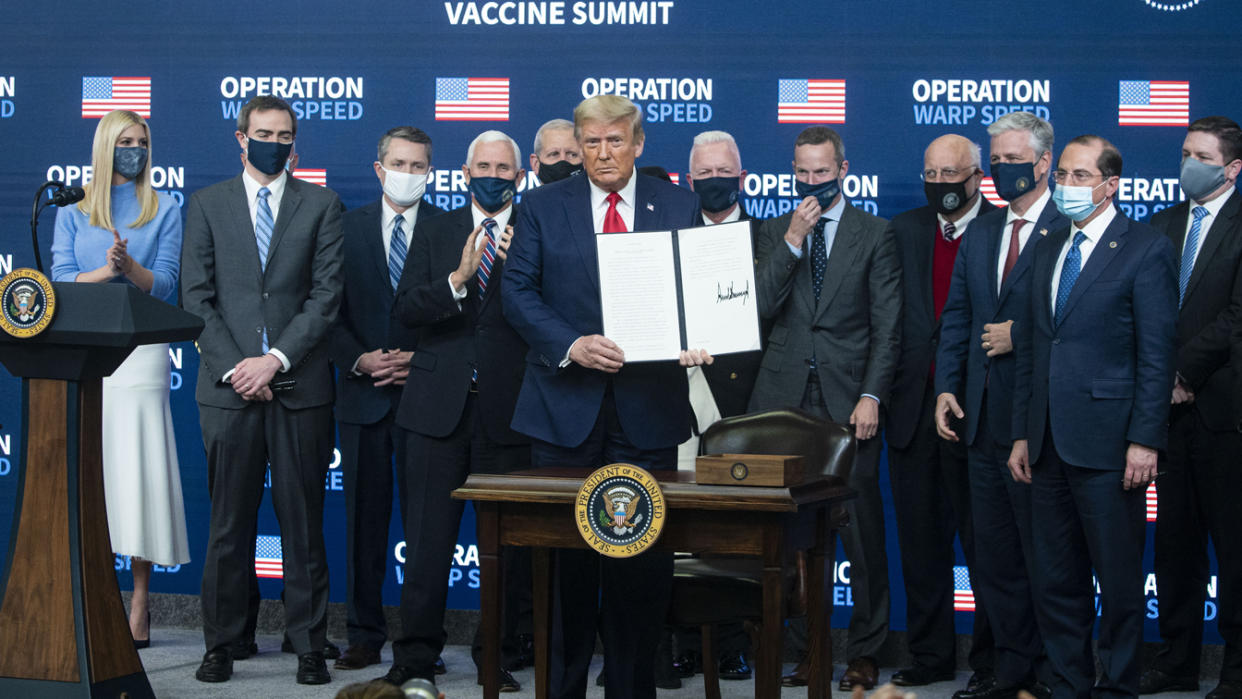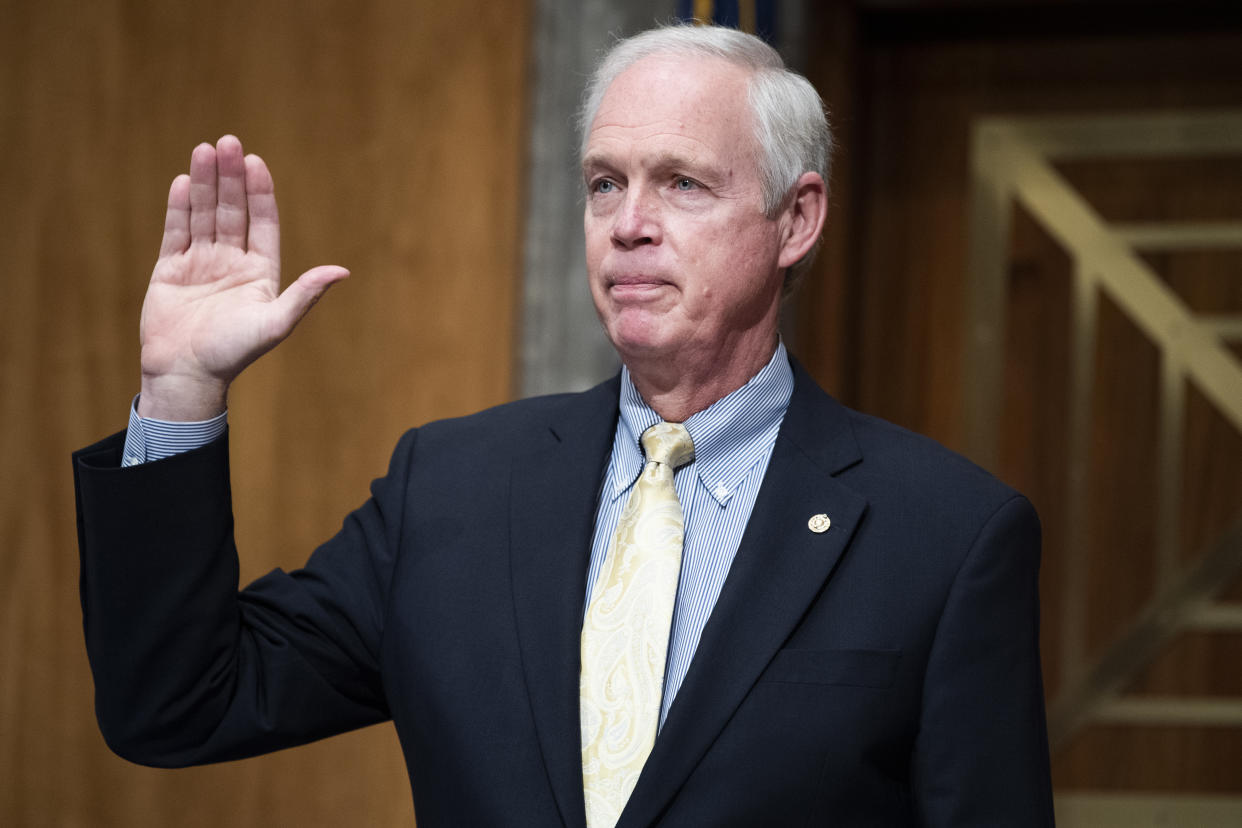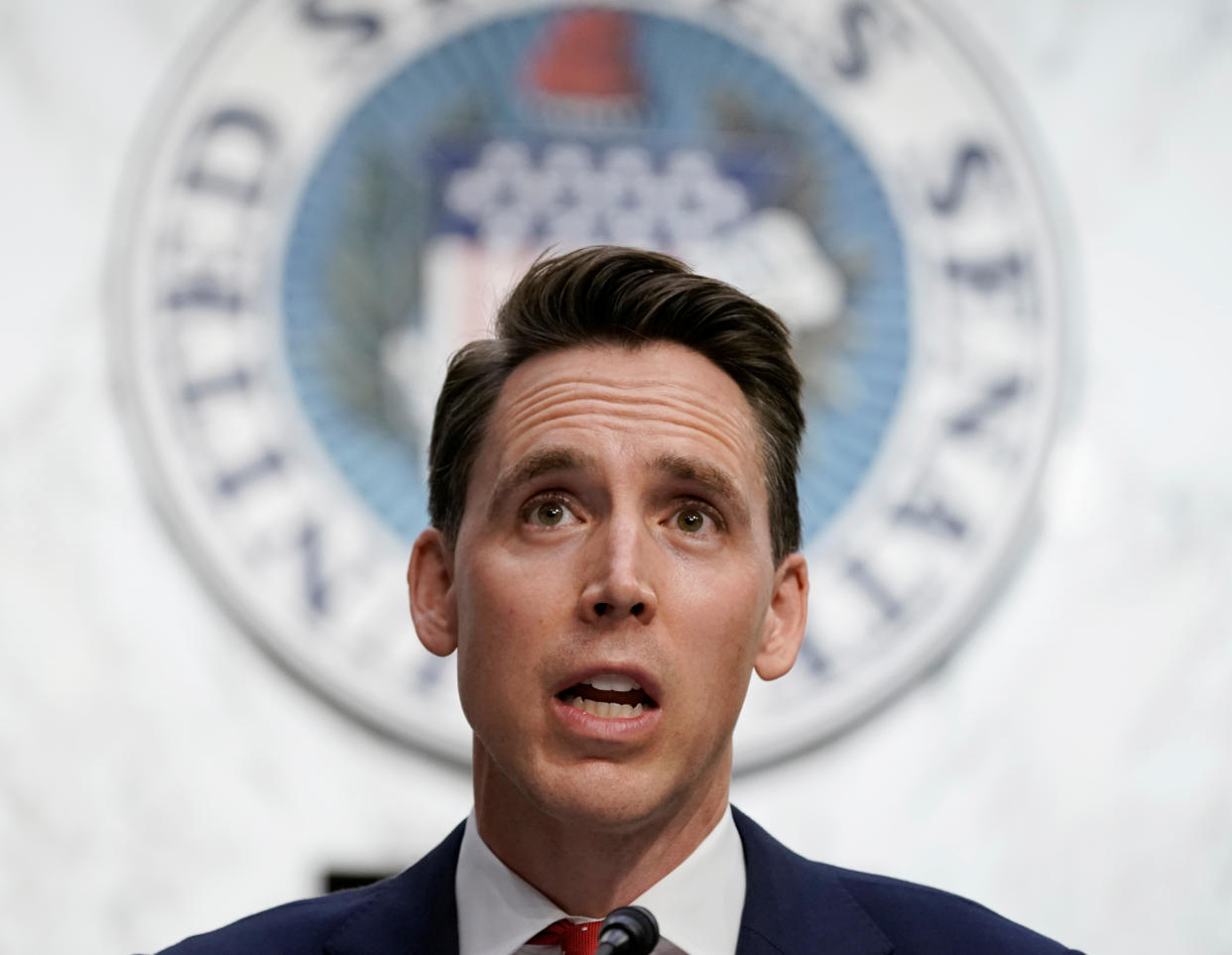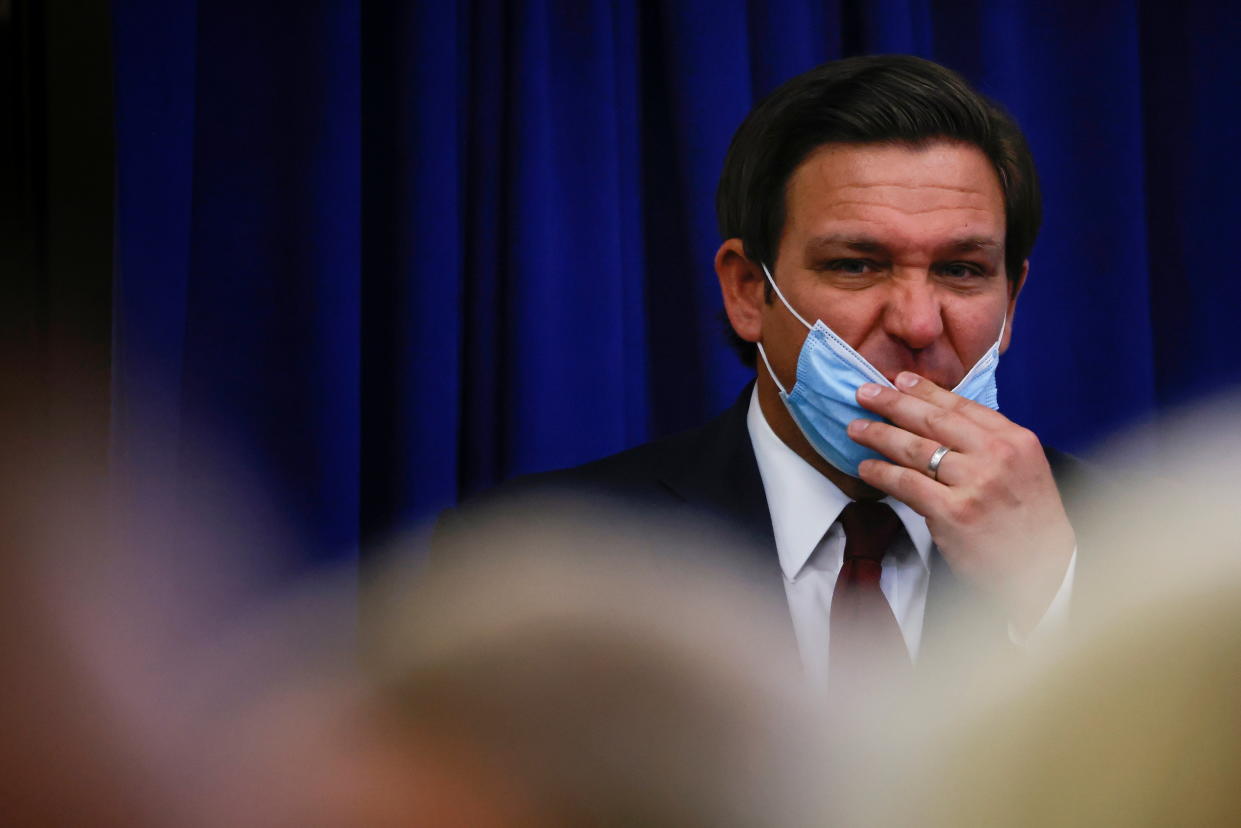White House vaccine rollout marred by confusion, false claims
WASHINGTON — The day President Trump planned to triumphantly announce the arrival of a coronavirus vaccine began with a Senate hearing at which Republicans focused on hydroxychloroquine, the discredited antimalarial drug some of Trump’s allies on Capitol Hill continue to insist is an effective coronavirus treatment. From there, the hearing moved to (inaccurate) comparisons likening COVID-19 to the flu, and diatribes against social media.
The blustery morning affair served as a perfect appetizer for Trump’s main course of conspiracy theories about the presidential election, itself an ominous sign of the fraught political conditions under which the coronavirus vaccine will be distributed.
“You just have to look at the numbers,” Trump said on Tuesday afternoon. He was not talking about the number of Americans who have died (285,000 and counting) from COVID-19, the disease caused by the coronavirus, or the number of Americans who can expect to get vaccinated in the months to come (some 20 million in December, according to administration projections), but the size of his imagined victory in last month’s presidential election.
“Look at all the corruption,” he went on to say, in remarks intended to celebrate Operation Warp Speed, the public-private effort to develop a coronavirus vaccine.
Tuesday also saw Trump signing an executive order that would “ensure that Americans have priority access to COVID-19 vaccines developed in the United States or procured by the United States Government.” The executive order seemed more a reiteration of the president’s “America First” message than a concrete policy directive, and it was undercut by news earlier in the day that Britain had already begun vaccinating its citizenry.

Asked about the ramifications of the executive order, Moncef Slaoui, who is leading the Operation Warp Speed effort, answered bluntly: “I literally don’t know.”
It was that kind of day.
At both the Senate Homeland Security Committee hearing and the White House summit on vaccines, Trump and his Republican allies on Capitol Hill struggled to come up with a coherent message on what the next stage of the fight against the pandemic will be. If Tuesday was any indication, that response will continue to be fractured, sometimes tendentious and sometimes in opposition to established science.
And that will likely remain the posture of the Republican Party once President-elect Joe Biden assumes the Oval Office on Jan. 20. Trump will almost certainly continue to be the loudest voice in the GOP, one that potentially undermines the new president’s efforts at a public-health course correction. Barring Democratic victories in two runoff elections in Georgia in January, the Senate will remain under GOP control during Biden’s first two years in office, allowing legislators with close ties to Trump to set the agenda for the upper chamber.
Among those allies is Sen. Ron Johnson, R-Wis., who chairs the Senate Homeland Security Committee and who on Tuesday held a hearing devoted to promoting discredited coronavirus treatments and maligning public safety measures.
There had been an outcry ahead of the hearing because one of the witnesses scheduled was Dr. Jane Orient, an outspoken critic of vaccines.
Another witness was Dr. Jayanta Bhattacharya of Stanford, a co-author of a petition against lockdowns called the Great Barrington Declaration. Among those who endorsed that much-criticized petition was Dr. Scott Atlas, until last week Trump’s top coronavirus adviser.

Ahead of the hearing, a petition circulated by Dr. Ashish Jha, dean of Brown University’s School of Public Health, and signed by many of the nation’s top public health experts, condemned the proceedings.
“We cannot allow groups and individuals pushing unproven treatments to threaten the progress we have made in medical science,” Jha and his co-signers wrote, “including the fundamental commitment to accepting scientific data as the basis for clinical decision making and public health.”
In his opening remarks, Johnson attacked Jha, saying that the purpose of the hearing was not to debate vaccines but to highlight unconventional therapeutic treatments for COVID-19. He went on to observe that hydroxychloroquine would have been a “dream solution” that should have been pursued more aggressively in the initial stage of the pandemic.
“Why didn’t we pursue that?” Johnson wondered. The answer has to do with the fact that the Food and Drug Administration has determined that hydroxychloroquine is unsafe for coronavirus patients because it can cause heart problems. Another drug touted vehemently by Johnson’s witnesses on Tuesday morning was ivermectin, which is used to treat heartworm in animals. The FDA says it, too, should not be used to treat the coronavirus.

Considering that the federal government is uniformly focused on distribution of a forthcoming coronavirus vaccine, it is not clear why Johnson decided to hold a hearing on largely discredited treatments and which also took aim at the use of face masks to slow the spread of the virus. Fond of litigating the president’s favorite grievances, Johnson has recently held hearings on counterintelligence measures during the 2016 election.
At one point, Johnson echoed one of Trump’s initial responses after the coronavirus first appeared in the U.S. in early 2020, saying COVID-19 was “certainly worse than the flu; but is it that much worse?”
Some of the very same witnesses Johnson had invited to testify rushed to say that the coronavirus was, in fact, much more severe than the flu. Johnson subsequently tried to retract his assertion.
Sen. Josh Hawley, R-Mo., another Trump loyalist, used his time to criticize social media companies for what he described as “censorship” of conservative thought. Twitter and Facebook have prevented false information about the coronavirus from being shared. In October, Twitter removed a message from Atlas, the White House adviser, because it misrepresented the efficacy of face masks. Those and other social media companies have also tried to limit the spread of misinformation about the 2020 presidential election, including by the president himself.

Conspiracies about the coronavirus and the presidential election have been merging, presenting a unique challenge for both democracy and public health. Trump himself is a former vaccine skeptic. Speaking to reporters on Monday evening, a senior administration official said it had not yet been determined whether the president would take the coronavirus vaccine. The official seemed to suggest that because Trump had already been sickened with COVID-19, and presumably has antibodies against the pathogen, he may not rush to get vaccinated.
A spokesman for Vice President Mike Pence did not say what his vaccination plans were.
Former Presidents Bill Clinton, Barack Obama and George W. Bush have all agreed to get the coronavirus vaccine, potentially on live television. But given the low trust many Americans have in Trump’s handling of the coronavirus, it is not clear if his also doing so would serve as a boost in public confidence.
Tuesday’s summit at the White House was intended to prepare the nation for the rollout of the vaccine, which is expected to begin within a matter of days. But both Pfizer and Moderna, the leading manufacturers of coronavirus vaccine, decided not to send representatives to Washington for the event.
Among those who did participate were the Republican governors of Florida, Ron DeSantis, and Texas, Greg Abbott. Both are close allies of the president but have been harshly criticized for their responses to the pandemic. The senior administration official who spoke to reporters on Monday told Yahoo News that they were selected — along with John Bel Edwards of Louisiana and Bill Lee of Tennessee — because those states had been judged to have the most thorough vaccine distribution plans.

But given the unpopularity of Abbott and, in particular, DeSantis, with people outside Trump’s political base, it is not clear how their attendance would inspire confidence in the coronavirus vaccine. That law enforcement officers in Florida raided the home of a coronavirus whistleblower on Monday night at gunpoint was unlikely to bolster DeSantis’s credibility outside the Trump movement.
Asked by Peter Alexander of NBC News why the incoming Biden administration was not present at the vaccine event, Trump said he would have to “see who the next administration is.” He then launched into a falsehood-riddled argument about how he had won the election, calling on judges and legislators of “courage” to take up his cause.
Several hours after Trump spoke, the U.S. Supreme Court declined to hear a case brought by his supporters intended to challenge the results in Pennsylvania. Since the election, Trump has devoted considerable attention to that and other legal challenges, even as the coronavirus continues to infect and kill a record number of Americans.
_____
Read more from Yahoo News:
